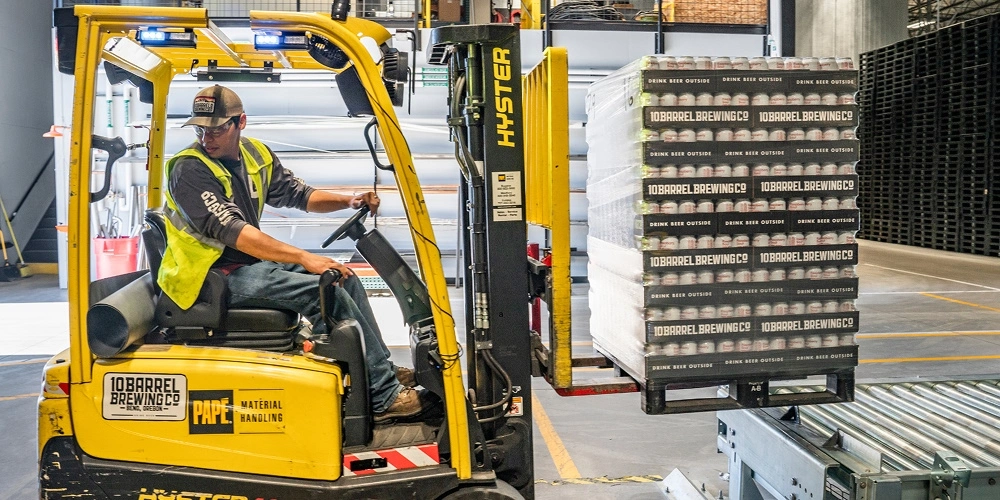Table of Contents
Join our
Mailing List
Stay up-to-date with BREW MOVERS latest news and service offerings.

Online Beer Orders: What Your Brewery Needs to Know
Published Date: 24 October 2023
The way consumers access their favorite products has evolved, and the world of craft beer is no exception. Online ordering is the present and the future.
Brewery owners, like you, are continually seeking innovative ways to engage with your customers and reach a broader audience. As the demand for craft beer continues to soar, it’s time to tap into a new avenue that’s been brewing—quite literally—in the world of beverage commerce: ordering beer online.
Is your brewery keeping up with the times? How can you seize this opportunity and navigate the logistics of online beer sales seamlessly?
This is where a managed logistics company becomes your indispensable partner. Discover not only why online beer orders are a game-changer, but also how partnering with a logistics expert can ensure your customers enjoy a smooth and satisfying beer-buying experience, from the first click to the last sip.

Getting Started With Online Beer Delivery
Offering online beer orders brings with it a set of unique challenges and considerations that brewery owners need to navigate effectively. Here’s what to consider when transitioning into the world of e-commerce:
Legal Requirements, Licenses, and Permits
It pays to be aware of any changes in local laws and regulations when it comes to alcohol sales, particularly when selling online. This includes guidelines for local or international alcoholic deliveries.
Do note that regulations differ by state, so it’s best to check in with your local government to confirm details. Additionally, each state also has differing tax requirements. Sort these out in advance to avoid missing deadlines that could impact your business operations. The fees associated with breaking rules are steep!
You also need to ensure you have the licenses needed to sell beer, or ensure yours are up to date or acquire them well in advance. These include:
- Manufacturer’s license: Allows you to sell your craft beer to the public.
- Alcohol dealer’s registration: Establishes you as a legal dealer of alcoholic beverages.
- Retailer license: Grants you permission to sell your beer commercially, whether online, in-store, in restaurants, or at events.
- Shipping license: Allows you to sell your craft beer to other states or countries.
Refine Your Website and Product Listings
Your website needs to be online beer order friendly. From implementing a robust age verification system to prevent underage sales, to creating an online shopping experience that’s user-friendly and informative.
This means having an interactive online menu and a full catalogue of your offerings with high-quality images and product descriptions. Ensure your product listings are optimized. This means keeping them clear and organized so customers can filter by category and subsections. For example, you could separate non-alcoholic, alcoholic, and gluten-free beer. From there, beer products can be filtered based on their style, and so on.
Most importantly, implement an easy-to-use and secure checkout process. Offer multiple payment options, including credit cards and digital wallets.
Packaging and Labeling
Packaging is critical to protect your product during transit and creating a positive unboxing experience for customers. Invest in sturdy and secure packaging materials that can withstand shipping and ensure your beer labels comply with regulatory requirements, including alcohol content and health warnings.

Manage Your Inventory
Managing your inventory is one thing, but keeping tabs on everything becomes much more complicated when you start fulfilling orders. You’ll be moving more products than ever to more places than ever when people order beer online—are you ready?
Keep your online inventory updated in real time to prevent overselling or advertising out-of-stock items. One way to do this is by investing in a robust inventory management system that integrates with your e-commerce platform to monitor stock levels in real-time. Another option is to consider batch and expiration date tracking to ensure customers receive the freshest beer possible.
You can also allow backorders, where customers can place orders or be put on the waitlist for out-of-stock items. This feature should also outline expected delivery times to help manage customer expectations when they place an order.
Shipping and Delivery Logistics
Selling craft beers direct-to-consumer (DTC) means your brewery doesn’t have to compete for shelf space or negotiate with intermediaries. Not only does this mean higher profit margins, but it also lets you offer reduced prices for customers who order beer.
That said, shipping and fulfillment can be difficult to manage. Having an amazing, high-quality beer selection won’t matter if you’re entrusting it to an unreliable team—this is why you should outsource your logistics.
Whether you’re moving golden ale, sour ale, an extra hoppy DIPA, or just some good old-fashioned lager, using a third-party logistics team is the key to ensuring your products arrive on time and in great condition.
Prepare Your Store for Online Beer Order Success
Don’t let anything compromise the quality of the beers you offer to customers. When it comes to beverage logistics, work with a service provider that specializes in shipping craft beer to reduce the risk of spoilage, delays, or any other avoidable errors.
Brew Movers specializes in temperature-controlled shipping so your product arrives in the condition it left your brewery. With two decades of logistics experience, you can rest assured that your shipment is always in good hands.
Looking to expand into online beer ordering? Contact us today to learn more about how we can support your supply chain operations!




